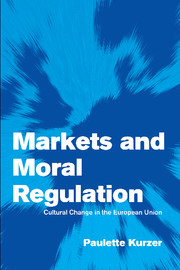Book contents
- Frontmatter
- Contents
- List of tables
- Preface
- 1 Markets versus morality
- 2 Binge drinking: the evolution of alcohol control policy in Finland
- 3 Our greatest social problem: anti-alcohol policy in Sweden
- 4 Nordic morality meets the European Union
- 5 Permissive pragmatism: drug control policy in the Netherlands
- 6 Harm reduction meets the EU: from public health to public order
- 7 Irish moral conservatism and European sexual permissiveness
- 8 The emergence of a European morality?
- Bibliography
- Index
8 - The emergence of a European morality?
Published online by Cambridge University Press: 16 October 2009
- Frontmatter
- Contents
- List of tables
- Preface
- 1 Markets versus morality
- 2 Binge drinking: the evolution of alcohol control policy in Finland
- 3 Our greatest social problem: anti-alcohol policy in Sweden
- 4 Nordic morality meets the European Union
- 5 Permissive pragmatism: drug control policy in the Netherlands
- 6 Harm reduction meets the EU: from public health to public order
- 7 Irish moral conservatism and European sexual permissiveness
- 8 The emergence of a European morality?
- Bibliography
- Index
Summary
In the past fifteen years or so, the scope and density of European Union activities have increased immensely. This study seeks to understand how these developments affect the normative and causal beliefs of the member states. The research design I employed examined singular or deviant morality frameworks, which endured in spite of the ascendance of very different models of behavior in the rest of the European Union. I argued that these morality standards survived new styles of thought and practices because of their centrality to the definition of collective self-identity. Collective ideas on controversial matters, such as drinking alcohol, drug use, or abortion, which deviate from mainstream thinking, foster a sense of national belonging.
Institutional action and political decisions in the spheres of abortion, alcohol, and drugs disclose deeply held beliefs on the self, personhood, and state governance. In the Western world, the self is considered subjective and aspires to autonomy and personal fulfillment. We find our identity through acts of choice and we are not dependent on the authority of religion or traditional morality. Notions of personhood vary greatly from culture to culture and variations reflect different social, political, and economic arrangements as well as different legal, religious, and philosophical legacies. I have argued in this book that Nordic alcohol control policy and the Irish proscription on abortion deviate from the European or Western conceptualization of the self in that they continue to subordinate the freedom to choose to the right of a higher authority to make decisions.
- Type
- Chapter
- Information
- Markets and Moral RegulationCultural Change in the European Union, pp. 170 - 185Publisher: Cambridge University PressPrint publication year: 2001



